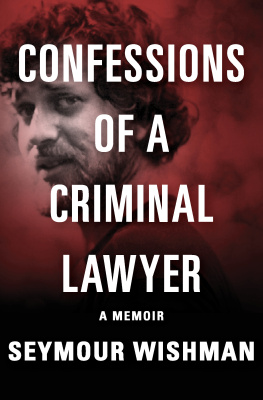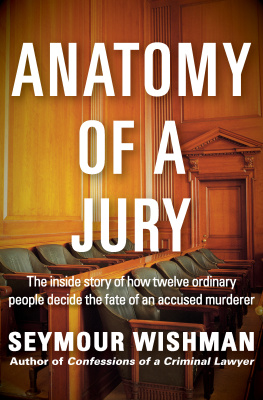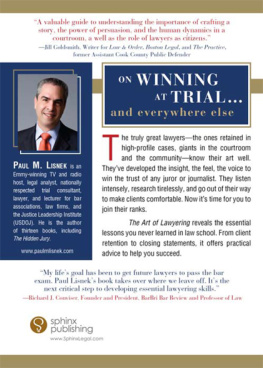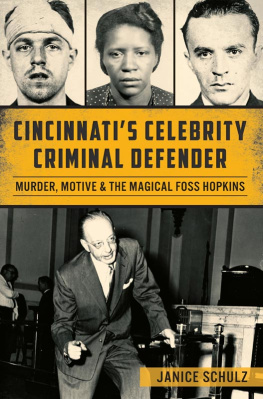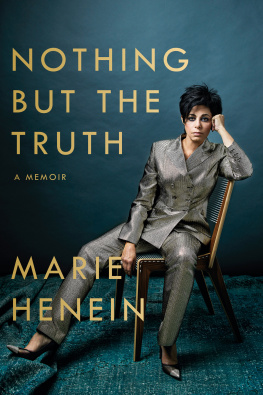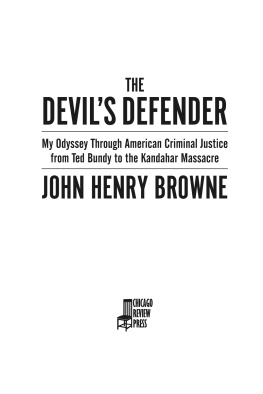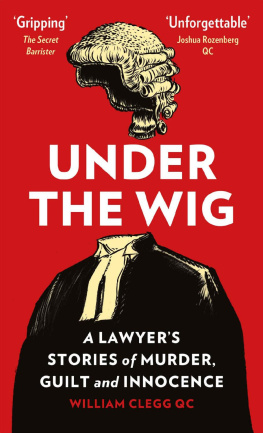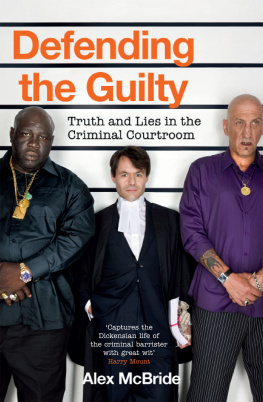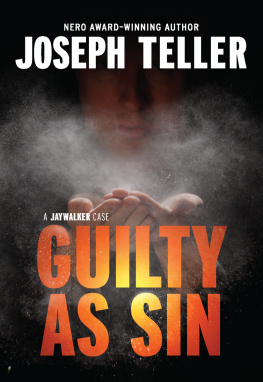
Confessions of a Criminal Lawyer
A Memoir
Seymour Wishman

To Nancy
I have to ask myself, what is there to show for this half lifetime that has passed? I look into my book in which I keep a docket of the decisions of the full court which fall to me to write and find about a thousand cases. A thousand cases, many of them trifling or transitory matters, to represent nearly half a lifetime!
Alas, gentlemen, that is life. I often imagine Shakespeare summing himself up and thinking: Yes, I have written five thousand lines of gold and a good deal of paddingI would have covered the milky way with words that outshone the stars! We cannot live our dreams. We are lucky if we can give a sample of our best, and if in our hearts we can feel that it has been nobly done.
Justice Oliver Wendell Holmes
at a dinner given in his honor
I
Accused: Thats the Lawyer!
IT WAS PAST TEN on a sweaty summer night when I accompanied the sister of a client to the emergency ward of Newark City Hospital. I had successfully defended her brother against a mugging charge about a year before, and was scheduled to begin a new armed robbery trial for him. The date of the trial was now in doubt because of the wounds he had received in a disturbance at the jail. I was rushing to see how he was, and to prevent him from saying anything incriminating to a nurse, doctor, or worse, the police, about the fight he had just lost with a guardthe guard would probably claim my client had attacked him, regardless of what had actually happened.
My clients sister and I joined the parade of wounded and mutilated bodies staggering through the swinging doors. Across the lobby, a heavy but not unattractive woman in a nurses uniform suddenly shrieked, Get that motherfucker out of here! Two women rushed forward to restrain her. Thats the lawyer, thats the motherfuckin lawyer! she shouted.
I looked around me. No one else resembled a lawyer. Still screaming, she dragged her two restrainers toward me. I was baffled. As the only white face in a crowd of forty, I felt a growing sense of anxiety.
Thats the son of a bitch that did it to me! she screamed.
I didnt know what she was talking about.
Kill him and that nigger Horton!
Larry Horton of course. Larry Horton was a client of mine. Six months before, I had represented him at his trial for sodomy and rape. At last I recognized the womans face. She had testified as the complaining witness against Horton.
WISHMAN: Isnt it a fact that after you met the defendant at a bar, you asked him if he wanted to have a good time?
LEWIS: No! Thats a lie!
WISHMAN: Isnt it true that you took him and his three friends back to your apartment and had that good time?
LEWIS: No!
WISHMAN: And, after you had that good time, didnt you ask for money?
LEWIS: No such way!
WISHMAN: Isnt it a fact that the only reason you made a complaint was because you were furious for not getting paid?
LEWIS: No! No! Thats a lie!
WISHMAN: You claim to have been raped and sodomized. As a nurse, you surely have an idea of the effect of such an assault on a womans body. Are you aware, Mrs. Lewis, that the police doctor found no evidence of force or trauma?
LEWIS: I dont know what the doctors found.
I tried not to acknowledge the screaming woman in white as I passed within several feet of her and the two women clutching her arms. Instead of looking at that angry face, I glanced around the room. Along the walls, on wooden benches and orange plastic chairs, twenty or more people sat staring at me; several people were laid out on stretchers with hanging bottles containing clear liquid dripping into their arms through long pink tubes. Nurses, doctors, and clerks were scattered around the room. Even the people on the stretchers were staring at me. Even the sister of my client, who was walking beside me, stared at me. I was frightened, but I tried not to show it.
I walked purposefully to the end of a long corridor where my client was being held. The guard told the sister to wait outside, but after I explained I was the inmates lawyer, he allowed me to go in.
My client was resting on a narrow table. His face had not been bruised, but his chest was wrapped with rows of tape. He told me that a guard had cracked three of his ribs with a stick, and that he hadnt made any statement. I told him his trial on the burglary would probably begin later that week, and I would try to dissuade the prosecutor from bringing new charges for the jail disturbance with the understanding that my client wouldnt press charges against the guard who had beaten him up.
There was no sight of Mrs. Lewis when I left the hospital. While driving home that night, I tried to recall the details of the trial with that woman. It was possible that the doctor who had found no evidence of force or trauma had been mistaken. The professionals who testified for the government were often incompetent. Some police doctors who had examined hundreds of alleged rape and sodomy victims over the years no longer performed their work with the same diligence or enthusiasm they might once have had. And, as was often true, many months had passed between the examination and the trial with Mrs. Lewis, leaving the doctor with only his notes to rely on, certainly not an independent memory of the examination, and in this case the notes were very sketchy. When I had asked him if there had been any evidence of force or trauma, we both knew he had neglected to mention in his report either the presence or absence of force. On the witness stand he had to either admit his negligent reporting or deny the existence of such evidence. I had made a point of holding his report in my hand, so when he said there had been no evidence of force, he knew he was avoiding my embarrassing next questions. But both of us knew that the truth of Mrs. Lewiss condition those many months earlier might have been very different.
Weighing on me more heavily than the possibility that I had helped a guilty man escape punishment was the undeniable fact that I had humiliated the victimalleged victimin my cross-examination of her. But, as all criminal lawyers know, to be effective in court I had to act forcefully, even brutally, at times. I had been trained in law school to regard the cross as an art form. In the course of my career I had frequently discredited witnesses. My defense of myself had always been that there was nothing personal in what I was doing. This woman was obviously unwilling to dismiss my behavior as merely an aspect of my professional responsibility; instead of an effective counsel, she saw me simply as a motherfucker.
I had applied to law school with a deeply held belief that I could satisfy some high, even noble, expectations as a lawyer. Although I had never articulated what those expectations were, I knew I cared about the poor and the underdog; although I may have had only a hazy idea of what justice was, I did have an acute, albeit intuitive, sense of injustice. I didnt talk out loud about such things, because I didnt want to sound self-righteous or naive, but the truth was that beyond vague, grandiose feelings, I had never really thought it through, even for myself. And those feelings of justice had never anticipated the anger of a humiliated witness.
Next page
